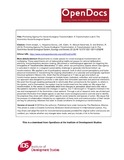Promoting Agency For Social-Ecological Transformation: A Transformation-Lab In The Xochimilco Social-Ecological System
| dc.contributor.author | Charli-Joseph, Lakshmi | |
| dc.contributor.author | Siqueiros, J. Mario | |
| dc.contributor.author | Eakin, Hallie | |
| dc.contributor.author | Manuel-Navarrete, David | |
| dc.contributor.author | Shelton, Rebecca | |
| dc.coverage.spatial | Mexico | en |
| dc.date.accessioned | 2018-07-17T11:09:18Z | |
| dc.date.available | 2018-07-17T11:09:18Z | |
| dc.date.issued | 2018 | |
| dc.identifier.citation | Charli-Joseph, L.; Siqueiros-Garcia, J.M.; Eakin, H.; Manuel-Navarrete, D. and Shelton, R. (2018) Promoting Agency For Social-Ecological Transformation: A Transformation-Lab In The Xochimilco Social-Ecological System, Ecology and Society 23 (2):46 | en |
| dc.identifier.uri | https://opendocs.ids.ac.uk/opendocs/handle/20.500.12413/13911 | |
| dc.description.abstract | Experiments to create spaces for social-ecological transformation are multiplying. These experiments aim at transcending traditional spaces for rational deliberation, planning, and participatory decision-making. We present a methodological approach for triggering the emergence of “transformation laboratories” (T-labs), which are participatory spaces where new agency is activated in relation to a stagnant sustainability challenge to generate intentional bottom-up transformations. We applied a set of participatory research tools to elicit current perceptions and foster personal involvement in transforming the ongoing urbanization of a culturally and ecologically significant historical wetland in Mexico City. Given that the emergence of T-labs as genuine bottom-up transformative spaces involves changes at multiple levels (individual, collective, and social-ecological), our approach was designed to promote a safe space that stimulates openness and personal interaction. We posit that through enabling participants to reformulate their connections to the system, to others in the system, and to themselves, the system may be transformed from the inside out. We argue that transformation, in this sense, is essentially about how changes in perception about one’s own role in the system’s dynamics translate into changes in agency. Our T-lab brought in 19 agents involved in the use and management of the Xochimilco urban wetland. Through a set of research tools, we elicited and presented information that helped agents to see their social-ecological position and role and to identify the practices they share with others within specific social networks and spaces of action. We argue that the process of collaboration initiated by our application of these tools and communication of their results are key for advancing initiatives that seek to create conditions for endogenous transformations. | en |
| dc.language.iso | en | en |
| dc.publisher | The Resilience Alliance | en |
| dc.rights | Copyright © 2018 by the author(s). Published here under license by The Resilience Alliance. This article is under a Creative Commons Attribution-NonCommercial 4.0 International License. You may share and adapt the work for noncommercial purposes provided the original author and source are credited, you indicate whether any changes were made, and you include a link to the license. | en |
| dc.rights.uri | http://creativecommons.org/licenses/by-nc/4.0/ | en |
| dc.title | Promoting Agency For Social-Ecological Transformation: A Transformation-Lab In The Xochimilco Social-Ecological System | en |
| dc.type | Article | en |
| dc.rights.holder | Copyright © 2018 by the author(s) | en |
| dc.identifier.externaluri | https://www.ecologyandsociety.org/vol23/iss2/art46/ | |
| dc.identifier.doi | 10.5751/ES-10214-230246 | |
| rioxxterms.funder | Default funder | en |
| rioxxterms.identifier.project | Default project | en |
| rioxxterms.version | NA | en |
| rioxxterms.versionofrecord | https://doi.org/10.5751/ES-10214-230246 | en |
| rioxxterms.funder.project | 9ce4e4dc-26e9-4d78-96e9-15e4dcac0642 | en |
Files in this item
This item appears in the following Collection(s)
-
ESRC STEPS Centre [225]
Except where otherwise noted, this item's license is described as Copyright © 2018 by the author(s). Published here under license by The Resilience Alliance. This article is under a Creative Commons Attribution-NonCommercial 4.0 International License. You may share and adapt the work for noncommercial purposes provided the original author and source are credited, you indicate whether any changes were made, and you include a link to the license.


